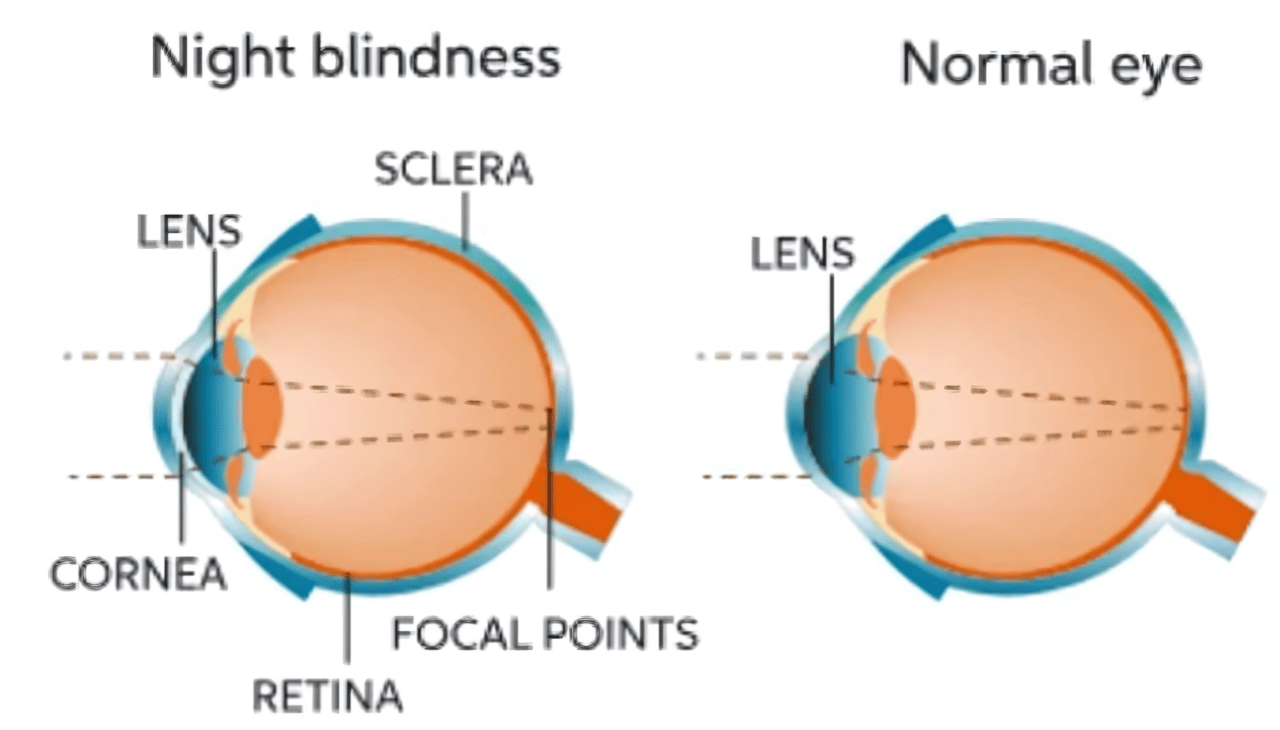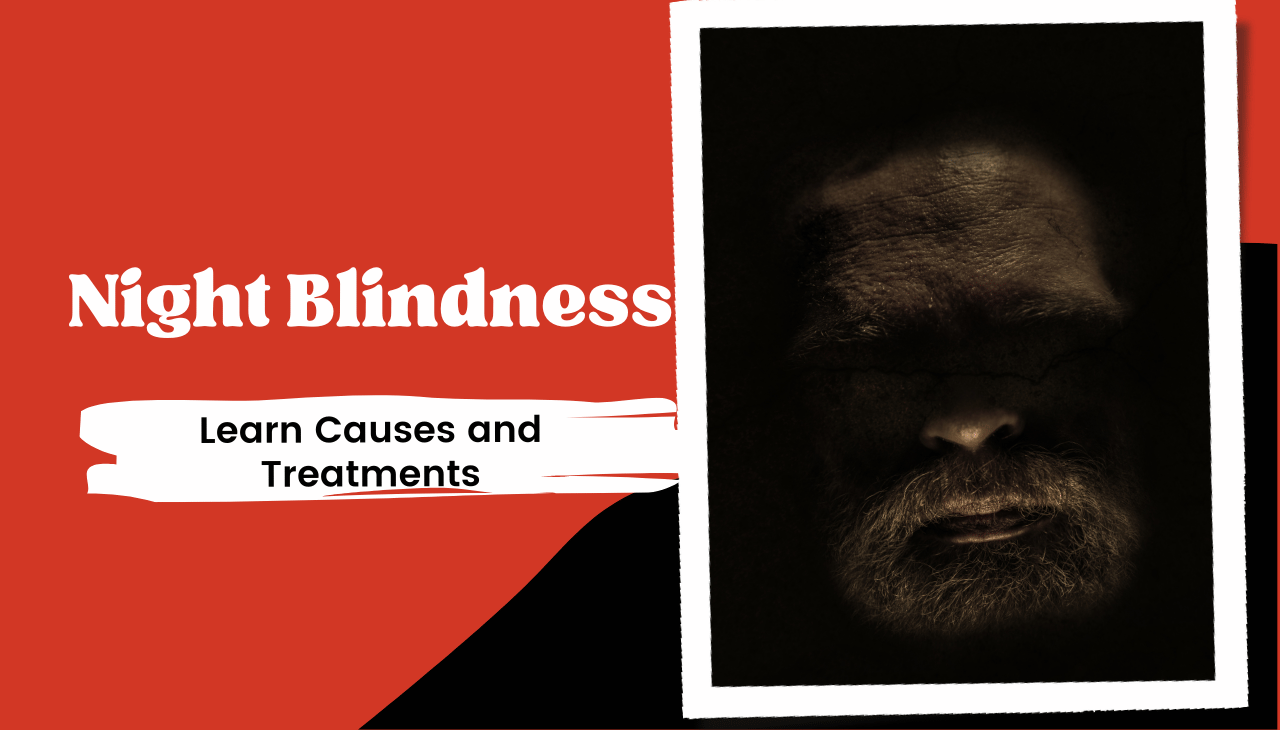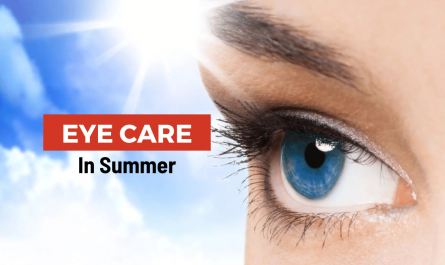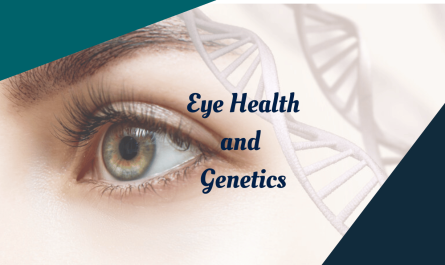Introduction
Night blindness can make everyday activities after dark challenging. If you find it difficult to see in low-light conditions, understanding this condition is important. It affects many people worldwide and may signal underlying eye problems. This blog explains what night blindness is, its causes, symptoms, treatments, and tips to manage it effectively.
What Is Night Blindness?

Night blindness, or nyctalopia, refers to difficulty seeing in dim light or at night. It is not a disease itself but a symptom of various eye conditions.
Normal vision depends on two types of light-sensitive cells in the retina: rods and cones. Rods are responsible for vision in low light, while cones handle color and detail in bright light. It occurs when the rods do not function properly, reducing your ability to see in darkness.
Night blindness can affect anyone but is more common in people with certain eye diseases, vitamin deficiencies, or genetic disorders.
Causes and Symptoms of Night Blindness
Causes:
- Vitamin A Deficiency
Vitamin A is vital for healthy rods in the retina. Deficiency can lead to night blindness and other vision problems. - Retinitis Pigmentosa
A group of inherited disorders causing gradual loss of rod and cone cells, leading to progressive night blindness and peripheral vision loss. - Cataracts
Clouding of the eye’s lens can scatter light entering the eye, reducing night vision. - Glaucoma and Medications
Increased eye pressure and certain drugs (e.g., those for glaucoma) may affect night vision. - Myopia (Nearsightedness)
People with high myopia may experience difficulties seeing clearly in low light. - Diabetic Retinopathy
Damage to retinal blood vessels in diabetes can impair night vision. - Other Causes
Eye trauma, infections, or diseases affecting the retina or optic nerve can also cause night blindness.
Symptoms:
- Difficulty seeing in dim lighting or at night
- Trouble adjusting when moving from bright to dark environments
- Increased risk of accidents in low-light conditions
- Reduced peripheral vision (in some cases)
- Difficulty driving at night or in poorly lit areas
If you experience these symptoms regularly, a thorough eye examination is necessary.
Treatment Options and Solutions

Treating night blindness depends on the underlying cause.
- Vitamin A Supplementation
For deficiency, vitamin A supplements and a diet rich in vitamin A (carrots, spinach, dairy) help restore night vision. - Managing Eye Conditions
- Cataracts: Surgery to replace the cloudy lens can improve vision significantly.
- Glaucoma: Treatment to reduce eye pressure can preserve vision.
- Diabetic Retinopathy: Controlling blood sugar and laser treatments may prevent progression.
- Cataracts: Surgery to replace the cloudy lens can improve vision significantly.
- Retinitis Pigmentosa
Currently, no cure exists, but low-vision aids, mobility training, and emerging gene therapies offer support. - Corrective Lenses
Proper glasses or contact lenses can improve vision clarity, especially in myopia. - Lifestyle Adjustments
Using brighter lighting at home, avoiding driving at night if vision is poor, and using night vision aids help manage symptoms.
Additional Tips and Recommendations
- Schedule regular comprehensive eye exams to detect issues early.
- Inform your doctor if you experience any change in night vision.
- Maintain a balanced diet rich in eye-healthy nutrients like vitamins A, C, E, and zinc.
- Protect your eyes from injury and infections by wearing protective eyewear.
- If night blindness affects your mobility or safety, consult an eye specialist for low-vision aids or rehabilitation.
About Laxmi Eye Hospital
Laxmi Eye Hospital is one of Mumbai’s largest eye care chains, serving patients for over 30 years. Known for skilled doctors and transparent treatment, it provides advanced diagnostics and eye care in Panvel, Kharghar, Kamothe, and Dombivli.
Specialties include Specs Removal / LASIK (Bladeless LASIK, ICL, IPCL, Contoura Vision LASIK), Cataract surgery, Glaucoma care, Diabetic eye treatment, Cornea Clinic (common diseases, keratoconus management, eye donation), Retina treatment, and Pediatric Ophthalmology.
Clinic locations:
- Dombivli: 1st Floor, Laxmi Eye Institute, SS Business Park, Gharda Circle, Azde Gaon, Tata Power Company Limited, Dombivli East, Mumbai, Maharashtra 421201
- Kharghar: Office 108, 109 and 110, 1st Floor, Anant CHS Plot 31, Sector 04, Kharghar, Navi Mumbai, Maharashtra 410210
- Panvel: Mulla Hamid Rd, Old Panvel, Panvel, Navi Mumbai, Maharashtra 410206
- Kamothe: Shop No 26/27, Near ICICI Bank, Kamothe, Navi Mumbai, Pratik Gardens, Plot No 153 to 165, Sector 34, Maharashtra 410209
Patients can book appointments by phone or through the hospital website.
Frequently Asked Questions
Q1: Can night blindness be reversed?
If caused by vitamin A deficiency or cataracts, treatment can restore night vision. Other causes may require ongoing management.
Q2: Is night blindness dangerous?
It can increase risks of accidents in low-light conditions, affecting safety and mobility.
Q3: How is night blindness diagnosed?
An eye doctor conducts a detailed eye exam, including tests of retinal function and vision in low light.
Q4: Can children have night blindness?
Yes, especially due to genetic conditions or nutritional deficiencies.
Q5: What foods help improve night vision?
Foods rich in vitamin A like carrots, sweet potatoes, leafy greens, and eggs support eye health.
Q6: Should I avoid driving at night if I have night blindness?
If vision is impaired, avoiding night driving is safer.
Q7: Are there any aids for people with night blindness?
Yes, low-vision devices, brighter lighting, and mobility training can assist.
Q8: Does LASIK surgery help with night blindness?
LASIK corrects refractive errors but does not treat retinal causes of night blindness.
Night blindness affects many but understanding its causes and treatments can improve your quality of life. Early diagnosis and appropriate care help manage symptoms and protect your vision. Reach out to eye care professionals if you notice difficulty seeing in the dark. Taking action today can make a difference tomorrow.




